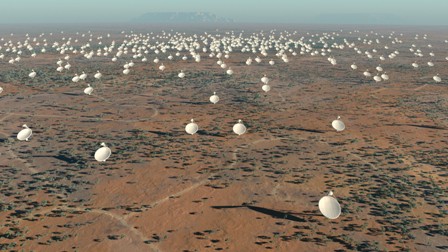By Michael Banks

Artist’s impression of the proposed Square Kilometre Array site in Austrialia (Courtesy: Swinburne Astronomy Productions)
I was rather hoping for more when I opened a press release from the Square Kilometre Array (SKA) organization this morning.
SKA, costing €1.5bn, is a proposed ground-based telescope that will allow researchers to probe the first 100 million years after the Big Bang for clues about galaxy evolution, dark matter and dark energy.
SKA will consist of around 2000–3000 linked antennas spread from a central 5 km “core” containing about 50% of the collecting area out to far-flung stations as much as 3000 km away. The telescope will then have the same collecting area as a hypothetical steerable dish 1 km across.
Two rival bids are going head to head to host the telescope: one led by Australia and the other by South Africa. The Australian design calls for a core in the west of the continent, with out-stations stretching eastwards to New Zealand. The South African project relies on a core in the Karoo region of the Northern Cape province, with the array extending northwards to eight neighbouring countries, including Madagascar and Kenya.
A decision on where to site SKA was widely expected to be made in February, and now the independent SKA site advisory committee has just submitted its evaluation report and site-selection recommendation to SKA’s board of directors.
Unfortunately for us mere mortals, we will not know the contents of the report until a later date. The press release gave no hint of who may host SKA, only saying that the seven members of SKA organization – which includes China, Italy and the UK – will now have a “face to face” meeting in “late March or early April” to consider the report’s conclusions and possibly make a decision about the location of the site.
If no consensus is reached at that meeting, then the members will “agree on the next steps in the process”. This one may drag on for some time to come.



